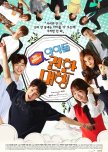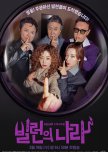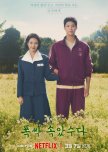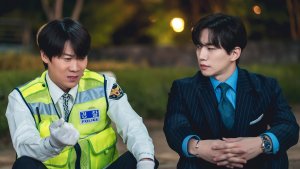 Jin Seon Kyu to reunite with 2PM's Lee Jun Ho in 'Typhoon Boss'
Jin Seon Kyu to reunite with 2PM's Lee Jun Ho in 'Typhoon Boss' Dans la Corée des années 80, une icône du cinéma et une starlette dénoncent une industrie dominée par les hommes et la corruption sur le tournage du film érotique "Madame Aema". (Source : Netflix) Modifier la traduction
- Français
- Arabic
- Русский
- Polski
- Titre original: 애마
- Aussi connu sous le nom de:
- Scénariste et Réalisateur: Lee Hae Young
- Genres: Comédie, Drame
Où regarder Aema
Subscription
Distribution et équipes
- Lee Ha NuiJung Hui RanRôle principal
- Bang Hyo RinSin Ju AeRôle principal
- Jin Sun GyuKoo Jung HoRôle principal
- Jo Hyun ChulKwak In URôle principal
- Hyun Bong ShikHeo Hyeok [Actor]Rôle Secondaire
- Ahn Kil KangPaul Ko [Costume designer]Rôle Secondaire
Critiques

Cette critique peut contenir des spoilers
Deux héroïnes explosives, pour une histoire qui s’éteint vite...
Alors "Aema", nous plonge dans les années 80 avec Jeong Hui-ran, une actrice confirmée qui en a marre d’être réduite à des rôles "osés", et Sin Ju-ae, une débutante prête à tout pour se faire une place dans le milieu 🎬. Le drama suit la production de "Madame Aema", le premier film érotique coréen, et l’alliance improbable de ces deux femmes face à une industrie dominée par les hommes 🤜🏻🤛🏻Franchement, sur le papier, ça avait tout pour être un drame percutant qui dénonce les dérives du showbiz… mais en vrai, j’ai trouvé ça creux et superficiel... 😕 Peut-être que son format court n’était pas adapté pour développer une histoire aussi riche 🤷🏼♀️
Le cœur du drama, c’est clairement le duo d’actrices, avec d’un côté Jeong Hui-ran, LA star expérimentée mais fatiguée d’être enfermée dans des clichés… et de l’autre, Shin Ju-ae, une débutante pleine d’ambition et prête à tout pour percer 🔥. Ça aurait pu donner une dynamique de dingue, et il y a bien quelques étincelles 💥, mais ils ont fait le choix de se focaliser uniquement sur cette relation plutôt que d’explorer les zones sombres de l’industrie, comme les compromis, les jeux de pouvoir, les abus… Résultat, je trouve que tout reste en surface, là où j'attendais un vrai coup de poing 👊🏻
Concernant les scènes hot 🔥… pour moi, elles n’apportent rien à l’histoire, elles sont juste là pour "faire joli" et attirer un public international 🙃. J’avais déjà eu ce ressenti avec "Somebody", et ici c’est la même impression... plus racoleur que narratif.
Bref, le concept était prometteur mais tout est resté plat, le scénario, les personnages, même le jeu des acteurs (malgré leur talent indéniable) ne m’a pas embarquée 😬. J’ai été au bout uniquement parce que ça ne faisait que 6 épisodes, mais honnêtement, je ne conseillerais pas de le prioriser dans votre liste ✌🏻
Cet avis était-il utile?

ONCE UPON A TIME IN CHUNGMURO
Madame Aema (1982) is a landmark in South Korean cinema. Released during Chun Doo-hwan’s authoritarian “3S Policy” era (Sports, Screen, Sex), it boldly tested the limits of censorship while becoming a commercial hit.Set in South Korea during the early 1980s, Aema follows the high-stakes world of Korea’s first erotic film, charting the journey of a seasoned star and an ambitious newcomer as they navigate a male-dominated industry rife with censorship.
Lee Hanee shines as Jung Hee-ran, a celebrated actress desperate to escape her sex symbol image, clashing with the manipulative producer Ku Jung-ho and director Kwak In-woo. Bang Hyo-rin’s Shin Ju-ae brings fire as a determined newcomer, whose ambition eventually leads her to forge an unexpected alliance with Hee-ran against systemic exploitation.
Visually, the series bursts with kaleidoscopic colors and audacious fashion, a stark contrast to the era’s typically somber portrayals. It foregrounds women’s solidarity while exposing the hidden suffering forced under patriarchal norms. Yet its message is paradoxically conservative: sexual desire is largely vilified, and only one character’s transactional sex is punished. The show favors energetic vignettes over historical accuracy, leading to caricatured characters and uneven tones, but it remains stylish and entertaining.
In essence, Aema is visually dazzling, thematically bold, and enjoyable, though its message and narrative clarity are somewhat muddled.
Cet avis était-il utile?









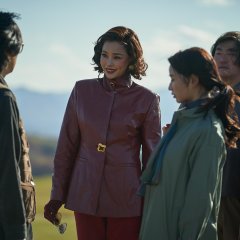
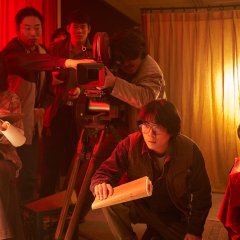
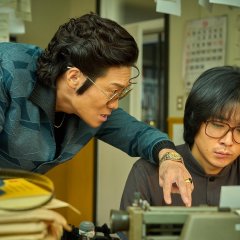


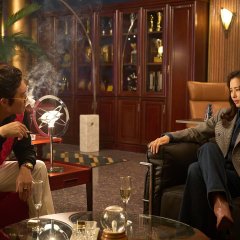
 1
1 1
1









